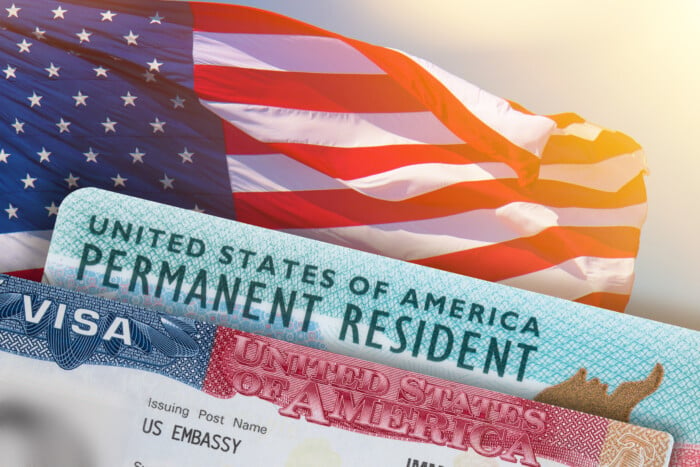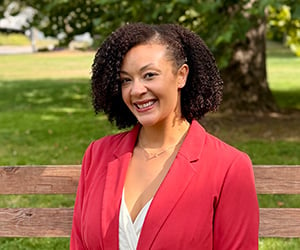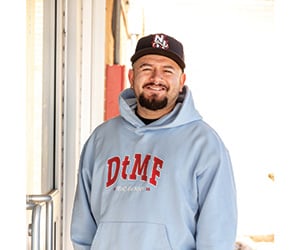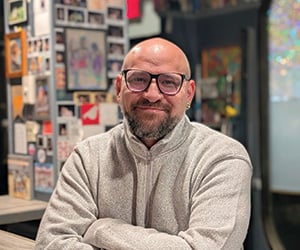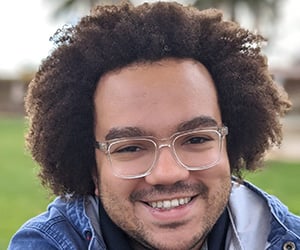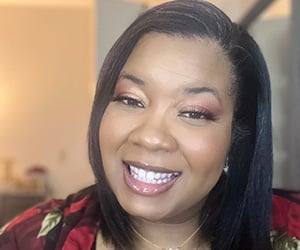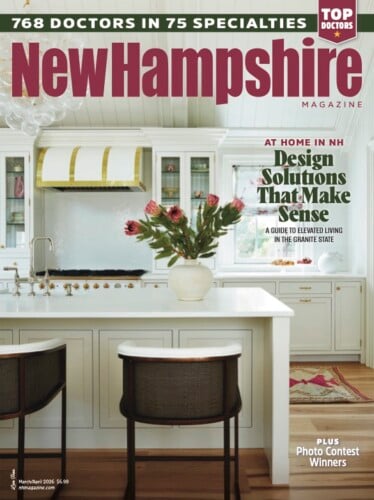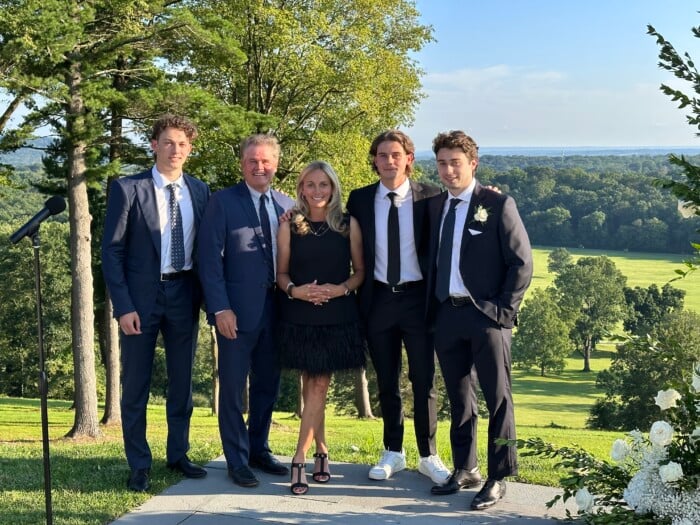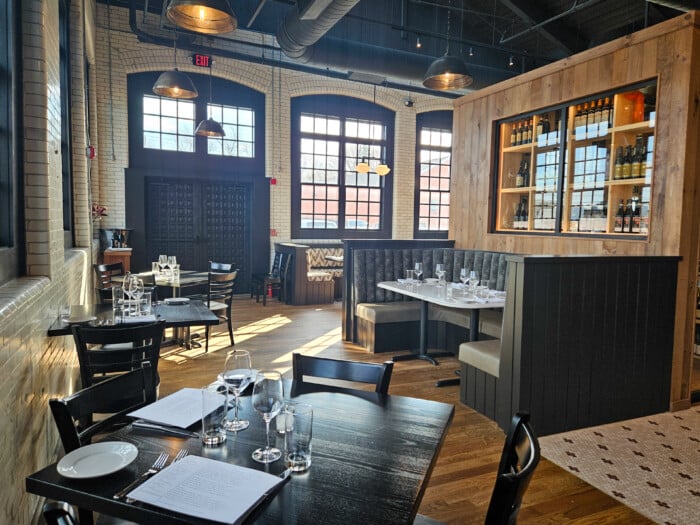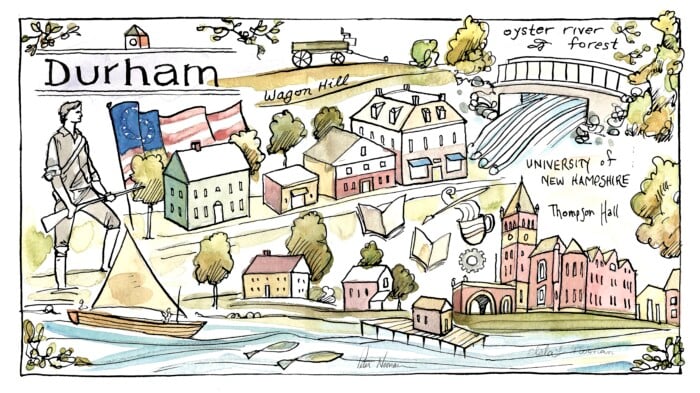Leading From the Ground Up
Louis Esposito and his vision for ABLE NH’s Future
 In July, Louis Esposito joined Advocates Building Lasting Equity in New Hampshire (ABLE NH) as its new executive director. ABLE NH is New Hampshire’s lobbying arm for the disability community. 603 Diversity met up with Esposito at Sheehan-Basquil Park during a fully integrated mural internship this past August. He’s a man who is not afraid to get dirty, climbing ladders, passing out popsicles and water, and working with staff from Opportunity Networks on the mural. The staff and participants seemed overjoyed to hang out with him. Wearing white-framed sunglasses and a tie-dye T-shirt, Esposito doesn’t give off the vibe of what you might imagine of a nonprofit executive. He’s invested in practices of organizational management: authentic, intentional, accessible and informed.
In July, Louis Esposito joined Advocates Building Lasting Equity in New Hampshire (ABLE NH) as its new executive director. ABLE NH is New Hampshire’s lobbying arm for the disability community. 603 Diversity met up with Esposito at Sheehan-Basquil Park during a fully integrated mural internship this past August. He’s a man who is not afraid to get dirty, climbing ladders, passing out popsicles and water, and working with staff from Opportunity Networks on the mural. The staff and participants seemed overjoyed to hang out with him. Wearing white-framed sunglasses and a tie-dye T-shirt, Esposito doesn’t give off the vibe of what you might imagine of a nonprofit executive. He’s invested in practices of organizational management: authentic, intentional, accessible and informed.
Q: We always start these things with the most obvious question, what is ABLE NH? Why do we need it? What’s the elevator pitch?
Louis Esposito: I’m gonna start with my background a little bit. Before ABLE, I was a special education teacher. I worked with students who had emotional disturbances … a technical phrase that I hate. Before that, I was the program director at Opportunity Networks for several years. Which was very cool because they really have a people-first approach. It got to a point where I was tired of feeling ill-adapted to address the problems my students and their families faced on a larger scale. There are a lot of systematic issues, which I felt I couldn’t change from my positions.
Q: That is actually something really unique about Opportunity Networks, which is covered in “Updating an Icon” (page 10). Its programming is more integrated and up-to-date than other programs nationally in addressing a non-isolationist approach to community members who have disabilities.
Esposito: And that’s sort of what you see sometimes. On a weekday afternoon, you might see adults with disabilities sort of wandering around the mall with no money to spend for shopping or eating at restaurants … and so many organizations are turning away from that approach and moving towards more intentional, creative and community-based programming for constituents. That’s when the question comes up then, what is true inclusion? Sure, there’s work programs, but what else? There are some art-making programs, and this summer’s mural internship with Positive Street Art was an example of that. I loved visiting the site and having art shoved in my face and having programming participants selling me their stuff for $30 a pop.
Q: Another major roadblock is people’s preconceived misconceptions of the capabilities of adults in these environments and frustration with behaviors, which happen to be purely circumstantial.
Esposito: That’s exactly it. You cannot approach people with anger. You don’t know the entire picture that paints the life of an individual; the feelings of lacking confidence or abandonment. And we never know what in all this creative and intentional programming will have permanent and lasting, positive affect on people. Connections with the community will have lasting impressions for people. I am thinking of systemic approaches versus materials-based approaches. Inclusive approaches look like stopping the removal of young people from settings with others their age. When you remove them and isolate them so that everyone around them grows up and moves on, they are trapped in the same place watching the world move. (Inclusivity) is so impactful for social learning.
Q: But why wouldn’t schools want to separate different leveled learners from each other? Wouldn’t it benefit people to be moving at their own pace?
Esposito: There are a lot of assumptions involved with isolating young people from each other. Negative connotations on “special education.” It is a disservice to people who are not in the disability community by creating these silos and essentially taking away potential lifelong friendships and compatriots.
Q: I never thought of how much the community is missing out by continuously isolating and marginalizing members of itself for being different. What are some other avenues ABLE NH is advocating for?
Esposito: Dental care is a major issue with people. Another approach to how we employ individuals involved in disability work: Why can’t the staff and guardians be compensated correctly? It’s bonkers that they are working so hard and have the care of an entire human being in their hands and are paid mostly $15-$20 an hour. Housing is another major issue. Often there are housing bills on the floor of the Capitol and people don’t think about how many marginalized demographics these bills are actually impacting. Transportation is another major issue, as is a lack of dual diagnosis health care.
These are all avenues ABLE NH is able to advocate towards in order to ensure equity for all of our community members, especially community members who are people with disabilities.
Q: What is your approach when you think of your leadership style?
Esposito: I guess I want to stay accessible. My background is from a myriad of different fields. Social, emotional and now I am in a doctoral program. So, I am thinking about the autonomy of people. When does an individual need to disclose their who-ness? How can we flip the script where the social construction around disability is the issue and not the individual? By focusing on the lived experiences of disabled individuals and promoting leadership that highlights these perspectives, we can create more inclusive and accessible spaces. It’s about challenging ableist structures and creating systematic changes. We need to recognize that disability is a social construct rather than an inherent flaw in an individual. The flaws are the barriers created by institutions and society that fail to accommodate human diversity. When society is unwilling to make this space, it creates the condition that marginalizes individuals. The problem lies in the system’s lack of inclusivity not in the person’s existence.
So, to go back to your first question, what is my elevator pitch? I want to be able to lead an organization that highlights and amplifies people from the disability community. We have groups in NH that are run by people with disabilities themselves like SALT (Self Advocacy Leadership Team) and People First of NH. These are two strong organizations with amazing and dedicated people. So, I guess we need infrastructural change to make this a norm in more settings. I want to amplify the voices of people with disabilities and address the problems that they face in living in an inclusive society. By focusing on the lived experiences of disabled individuals and promoting leadership that highlights these perspectives, we can create more inclusive and accessible spaces. It’s about challenging ableist structures and creating systematic changes. This is a holistic issue.
Q: I just signed up to be a member of ABLE NH because I wanted to be up to date on what policies are affecting the disability community, and I didn’t think the monthly charge was too steep. Are there other cool things a person gets when they sign up for a membership with ABLE?
Esposito: The reality is we do not get any state or federal funding because we do policy advocacy. The memberships help immensely with our efforts. People do get emails about what is going on on the ground. They will have a direct voice in the direction of the organization. They will have access to training which will help to foster more inclusive placemaking and educational environments. Anyone can be a member, but ideally, we need more engagement from the disability community.
Q: In October was the annual Disability Justice Parade. Last year it was at Arms Park in Manchester. How was it this year?
Esposito: This year we planned to walk up Main Street in Concord right to the lawn of the capital building. This was on Saturday, the day after our Friday conference, “The Art of Advocacy” at the Holiday Inn in Concord. If you want to know more about what we’re doing, visit our website at ABLENH.org. It’s pretty informative and very easy to navigate. And if y’all have any questions about joining up and helping out, email info@ablenh.org.
This article is featured in the winter 2024 issue of 603 Diversity.
603 Diversity’s mission is to educate readers of all backgrounds about the exciting accomplishments and cultural contributions of the state’s diverse communities, as well as the challenges faced and support needed by those communities to continue to grow and thrive in the Granite State.
